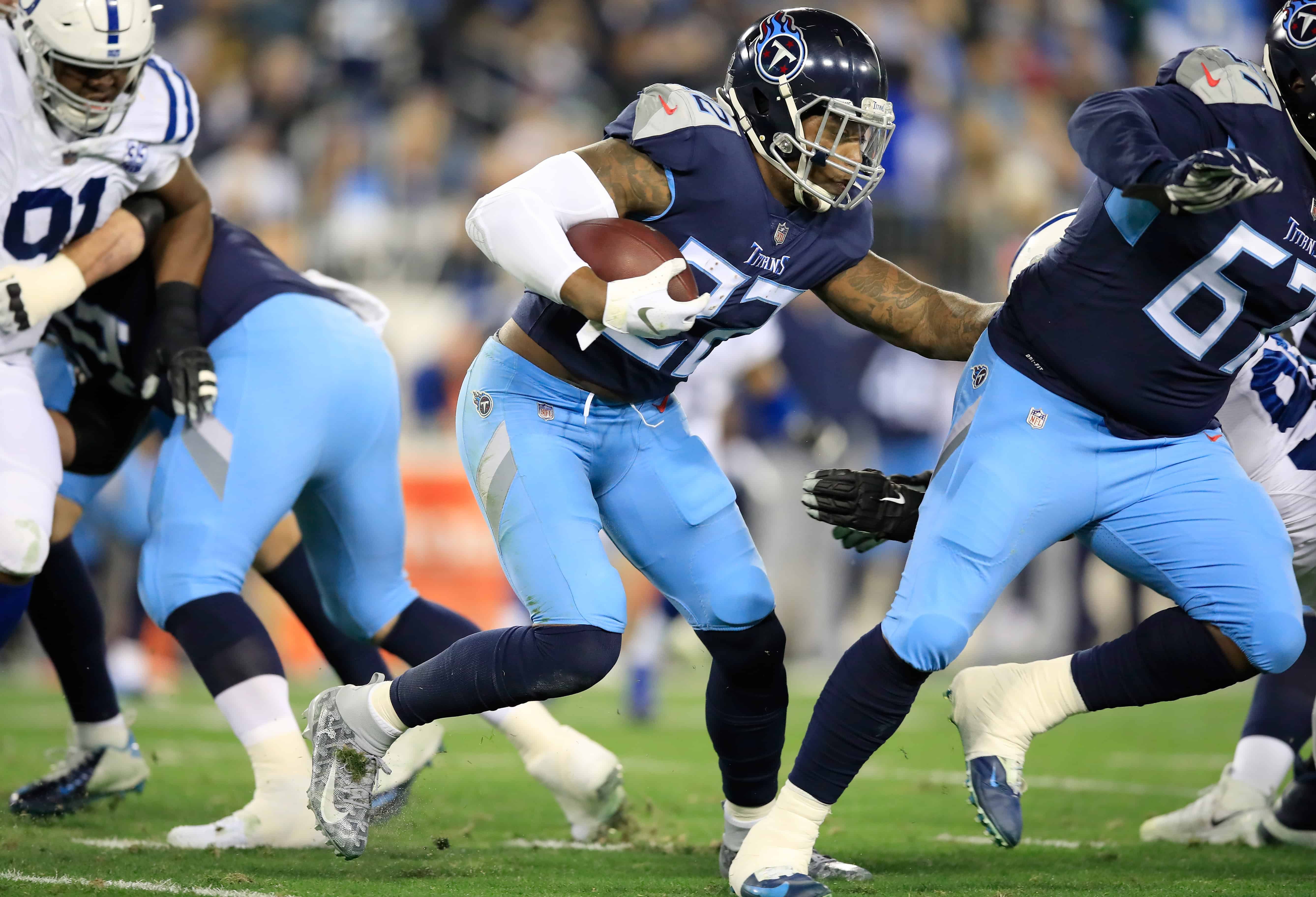We've gone over what to look for when analyzing team win totals, so now let's take that and pick a few totals that stand out. We'll look at three below with some more totals and futures early next week.
Note: all win totals and futures lines listed are sourced through 5Dimes
Cincinnati Bengals: Over 6 (-125)
2018 Record: 6-10
2018 Record in one-score games: 2-5
2018 Pythagorean Win Expectation: 6.0
2019 Strength of Schedule Rank: 13th-easiest
Adjusted Games Lost to Injury: 5th-most
- In the first eight games of 2018, the Bengals went 5-3 with impressive road victories at Indianapolis and Atlanta and at home against Baltimore. In that stretch, the offense produced a 49.4% success rate, good for ninth-best in the NFL while also ranking sixth in most explosive plays. After season-ending injuries to A.J. Green and Andy Dalton, the Bengals ended the season with a 1-5 stretch.
- Tyler Boyd finished the 2018 season top-5 in the NFL in both DVOA and success rate for wide receivers. In the final six games of the season, Joe Mixon produced nearly 600 yards on the ground and did so while averaging 5.4 yards per carry in that span. In a lost season, having both Boyd and Mixon step up adds promise to a 2019 potential offensive breakout for the Bengals.
- Zac Taylor was hired away from the Rams to become the new Bengals head coach, taking over for Marvin Lewis. It’s always difficult to know for sure if a new coach will ultimately be successful in a new role but recent history suggests Taylor could have an immediate impact. There is no doubt that the modern NFL is a pass-heavy, offensive-led league. Granted this is a limited sample size but since 2016 there have been nine new first-time NFL head coach hires who had offensive backgrounds — Matt Nagy, Frank Reich, Sean McVay, Kyle Shanahan, Doug Pederson, Adam Gase, Anthony Lynn, Dirk Koetter, and Ben McAdoo. These nine coaches took over teams with a combined 45-99 record the previous year of their hire, good for an average of 5-11. The average first-year record under these nine coaches was 9-7, a staggering four-win improvement. Eight of the nine teams’ records improved the next season with only one, Pederson and the Eagles, staying the same with a 7-9 record. Five of the nine teams made the playoffs in the first year with the new head coach and none finished worse than 6-10. The Niners went 6-10 in Shanahan’s first season but even that was a four-game improvement over the 2-14 record before he was hired. There definitely is something to be said for the initial, one-year “juice” a first-year coach can make to a team like the Bengals who had become stale under Lewis.
- Undoubtedly Taylor will incorporate more 11 personnel (three wide receivers). With Green, Boyd and former first-round pick and speed burner John Ross, the passing game has a chance to be explosive. If Ross can play the Brandin Cooks role in Taylor’s offense, he could have a breakout season.
- After facing the league’s third-toughest schedule in 2018, Cincinnati projects to face a schedule that ranks 13th-easiest based on expected Vegas win totals of its opponents.
- Aside from the injuries to Dalton and Green, the biggest issue with Cincinnati in 2018 was the defense. They finished 32nd in defensive success rate and 28th in DVOA defensive ratings. The Bengals had the worst third-down percentage defense in the NFL and the worst such percentage in the NFL since the 2011 Chargers. The last 10 teams that ranked last in defending third downs improved their ranking by 12 spots on average the following season. Cincinnati was a bit unlucky in that they faced every team ranked in the top-five in the NFL last season in third-down offense. Fortunately for Cincinnati, they don’t face any team ranked in the top-five last season. Cincinnati’s struggles on third down can be explained almost entirely by the inability to defend tight ends. The Bengals allowed an absurd 75 percent success rate to tight ends on third down, by far the worst in the NFL and 12 percent worse than Miami, the next-worst defense. The Bengals were better against tight ends on first and second downs, so it seems improbable they will repeat these struggles again.
- The Bengals were unlucky in allowing the third-highest field goal percentage by opponents at 92 percent last season. In addition, they ranked 27th in Football Outsiders’ Hidden Points Special Teams stat, which are the elements of special teams like punt and kickoff distances that are essentially out of their control.
- Awful third-down defense and unfortunate special teams luck contributed to the Bengals finishing 2-5 in one-score games in 2018, including 0-4 in one-score games against division opponents. Even minor natural regression from the defense and the special teams unit should help the Bengals win more close games in 2019 and I believe will go over six wins.
Tennessee Titans: Under 8 (-125)
2018 Record: 9-7
2018 Record in one-score games: 4-3
2018 Pythagorean Win Expectation: 8.2
2019 Strength of Schedule Rank: 4th-hardest
Adjusted Games Lost to Injury: 11th-fewest
- Tennessee finished a nondescript season at 9-7, and just missed the playoffs in 2018. Quarterback Marcus Mariota continues to be an enigma for the franchise and ended the season with only 11 touchdowns, eight interceptions, and 7.6 yards per attempt. His performance had him finish as the 27th-rated quarterback by DVOA after finishing 20th in 2017. Most alarming is that Mariota’s numbers have declined in back-to-back years after showing promise in 2016. Unless something dramatic changes he is not a quarterback who has shown he can carry an offense to an elite level, and this may be his swan song with the Titans. Barring a top-5 elite defensive performance, the upside for wins with this Titans team is essentially capped because of the inconsistency at quarterback.
- Based on net success rate, the Titans were the 26th-ranked team in the NFL last season, 24th on offense and 23rd defensively. When you include finishing 20th in overall DVOA, 18th in net yards per play and a Pythagorean expectation of 8.2 wins, the Titans overachieved with a 9-7 record last season.
- The Titans project to face the fourth-toughest schedule based on Vegas win totals of their opponents. The AFC South expects to be highly competitive as well with Indianapolis, Houston, and Jacksonville all potential playoff teams. I only project the Titans to be clear favorites in three games: at home against Buffalo, Tampa Bay, and Jacksonville.
- Last season the Tennessee defense struggled against offenses that ran 11 personnel, ranking eighth-worst in the NFL in success rate allowed. In 2019, the Titans face teams that ranked in the top-4 in 11 personnel success rating six times: the Chargers, Saints, Panthers, Chiefs, and Colts twice.
- The Titans really didn’t do anything well on offense last season besides handing the ball off to Derrick Henry, who recorded the 14th-highest success rate among running backs. The problem is that Tennessee faces the sixth-most difficult run defense schedule, including five games against defenses that ranked in the top-5 in run defense success rate last season.
- The Titans went 4-3 in one-score games last season after going 6-4 in 2017 and 6-3 in 2016. After going a combined 16-10 (62 percent) in one-score games the last three seasons, it would be natural for Tennessee to drop off a bit this season. Odds of a fourth-straight record over .500 in close-games are pretty low.
- I also expect some negative regression in fumble recovery percentage which could impact the Titans positive record in one-score games. The Titans finished with the eighth-best fumble recovery percentage after ranking dead last in 2017. Typically following a significant reversal in a luck stat like fumble recovery rate, we would expect the team to rank closer to the middle of the pack the following season. Since 2013 there have been six instances where a team ranked in the bottom three in fumble recovery rate and then finished top-10 the following season like the Titans. Following this extreme reversal in recovery rate, the next season those six teams on average ranked 19th.
- Besides the under win total of 8, I see some good value in fading the Titans in future game lines that are currently up on 5dimes. For example, Atlanta (-3.5) at home against the Titans Week 4 looks like a bargain. I expect Atlanta to be a heavily bet on team early in the season with a healthier defense and this line is suggesting that these teams are essentially even. My personal line in this game would be closer to ATL (-5). Denver (+2) Week 6 at home against Tennessee is another line that I think is off. This line suggests that Tennessee is about 5.5 to 6 points better than Denver on a neutral field. I think this line is off by 2.5 to 3 points.
Philadelphia Eagles: Over 10 (-105)
2018 Record: 9-7
2018 Record in one-score games: 6-6
2018 Pythagorean Win Expectation: 8.5
2019 Strength of Schedule Rank: third-easiest
Adjusted Games Lost to Injury: second-most
- The Eagles are one of only three teams last season that posted a top-15 net success rate (12th-best) while facing a top-10 schedule (sixth-hardest). This season the schedule is projected to be the third-easiest in the NFL.
- Philadelphia was unlucky in a number of categories last year that should improve, including ranking 23rd in fumble recovery rate, 24th in hidden special teams, 25th in turnover margin and most importantly had the second-most adjusted games lost due to injury. Obviously, Carson Wentz’s five missed games were the most impactful, but the secondary was decimated; four starters from Week 1 missed a combined 30 games during the season. The injuries in the secondary make the fact that the Eagles still had the 15th-ranked DVOA pass defense while facing the eighth-toughest schedule of pass offenses, even more impressive. In 2019, the Eagles are expected to face the third-easiest set of pass offenses based on last year’s DVOA pass offense rankings. Philadelphia plays their final five games against three of the league’s worst projected teams in Washington, the Giants, and Miami. There is a good chance the Eagles will get to face four rookie quarterbacks and Josh Rosen in those final five games. Also, Timmy Jernigan and Derek Barnett missed 23 games on the defensive line, which played a factor in the defense dropping to 26th in adjusted sack rate in 2018. The cluster factor of the secondary, defensive line and, Jordan Hicks injuries really took a toll on that defense. The biggest key to another Super Bowl run may just come down to health.
- Three areas the Eagles struggled on offense the most last season include run game efficiency, touchdown rate in the red zone, and a lack of explosive plays. The run game was virtually non-existent and ranked 27th in DVOA. The Eagles tried to address that and drafted Miles Sanders out of Penn State, which could go a long way in making the offense more versatile and explosive. Sanders had the fourth-highest SPARQ score among running backs invited to the combine this season. In 2017, the Eagles had the No. 1 touchdown rate in the red zone in the NFL and dropped to 17th last season. The Eagles will look to improve their red zone offense this season. Also, the Eagles have ranked 24th and 18th in explosive pass plays the last two seasons. so picking up DeSean Jackson to add some firepower to the deep passing game could open up the offense. According to ESPN Stats and Info, during Jackson’s career, his quarterbacks experienced a completion rate increase of seven percent, an additional 3.0 yards per attempt. and an improvement of 0.65 to their TD/INT ratios when playing alongside Jackson versus not having him off the field. Add this to the fact that Wentz is seventh in deep accuracy percentage in the NFL, according to Pro Football Focus, and the Eagles should turn in more explosive pass plays this season.
- Philadelphia should see positive injury regression, they have the pedigree of a Super Bowl champion and will most likely have one of the easiest schedules in the NFL. The Eagles should be considered one of the favorites to represent the NFC in the Super Bowl.
















